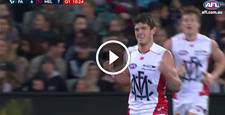There was great excitement among the Baker men when I announced I’d been granted an audience with the AFL Player of the Century, his Lethalness, Leigh Matthews.
There was great excitement among the Baker men when I announced I’d been granted an audience with the AFL Player of the Century, his Lethalness, Leigh Matthews.
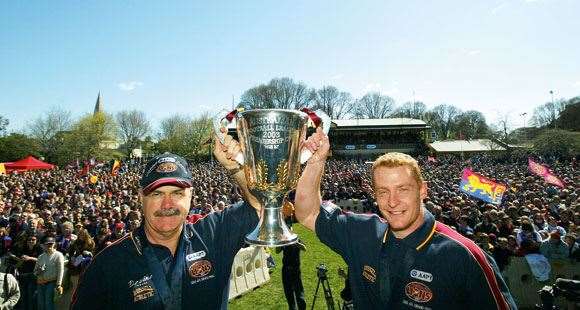 The Lions are in Voss’ hands now, after Lethal passed the mantle on last season. Images: Getty Images
The Lions are in Voss’ hands now, after Lethal passed the mantle on last season. Images: Getty ImagesSome quick email polling produced a flood of proposed questions and wardrobe suggestions. Would it be too much to wear the old Hawthorn jumper? Probably. Should I take a footy and suggest a quick kick? Probably not. See, dad and us three boys had trotted off to watch the Hawks every Saturday through Melbourne’s dire winters for years. It was our great male bonding ritual. Then we all started moving about – overseas, interstate. The Hawks fell on hard times and the interest waned. Of course, recent events have reignited the flame. So the chance to interview Matthews – as generous a bone as your caring editor has ever thrown a freelance chump like me – was an opportunity to revisit my childhood. I was as adrenalised as a ten-year-old jumping the fence, autograph book in hand, as the final siren sounded at Princes Park.
I’ve been gathering questions from my dad and brothers, all keen Hawks supporters ...
It’s a great thing about the footy, the way it keeps families together. It’s one of the few things that families do together. I have grown-up daughters, 38 and 36, and they were growing up while I was playing and then I was involved in coaching. I’m looking forward to actually being able to take my grandchildren. Whether they’re interested or not is another matter. I have a ten-year-old granddaughter – I don’t think she’s terribly interested. The four-year-old boy might be.
My dad wanted to know who’s the hardest player you’ve seen?
[Pauses] Probably Gavin Brown and Tony Shaw at Collingwood, and Michael Voss and Jonathan Brown at the Lions. The “hardness” for me is the guys who are prepared to just keep their eye on the footy and attack it so hard that their body becomes a battering ram … I always thought Gavin Brown and Michael Voss were just that. They attacked the ball so hard … They weren’t deliberately trying to hurt other players, but they still did.
My dad thought it might’ve been Des Dickson, who played at Hawthorn in the ‘60s, and wondered if you ever saw him?
[Thoughtfully] Des Dickson … before my era. That’s more the people who might hurt you. He was a bit before my time, but he had the fearsome reputation – a bit like Ronny Andrews playing for Essendon when I played – and probably rightly, that he might well hurt you, inflict some punishment on the opposition players at any moment. Even, I suspect, back in that era, the bark was probably bigger than the bite.
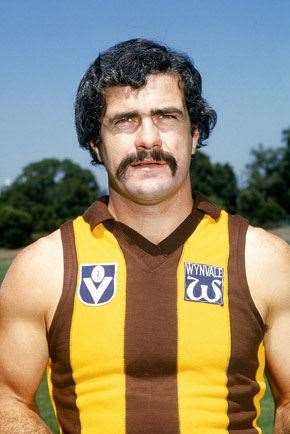 Leigh Mathews. Image: Getty Images
Leigh Mathews. Image: Getty ImagesHow do you rate the three great Hawthorn full forwards – Hudson, Dunstall and Franklin?
They’re all magnificent goal kickers. Peter Hudson as a goal kicker probably had no peer. But Dunstall, his ability to chase and pressure-out the forward line, I think elevated him to be the best of the full forwards in my time of watching, and the most valuable. He kicked the goals, but he also maintained that defensive pressure. Not many of the others can do both. Hudson just had an enormous gift for getting the footy. Franklin’s a physical freak. He’s probably the player I most enjoy going to watch. What he can do for a bloke over 198cm, almost ruckman height, his manoeuvrability and his ball skills and his stamina, he’s genuinely the physical freak.
You’ve been involved in three very different clubs at different points in their histories. Were they very different cultures? Is there something of that culture that endures over time?
I heard a definition of culture – it’s what you do if no one tells you what to do. Culture changes with people and I’m not a great believer that a club has a certain culture over the generations. You have a certain culture when a certain group of people are there and when those people are no longer there, usually the culture changes as well. One of the things that was a little bit different with the Brisbane Lions, being a new club and not being there for generations, we didn’t have a powerful past player lobby. Sometimes they aren’t terribly helpful.
This question’s been asked before, and there are various theories, but why do you think Hawthorn produced so many coaches out of that era in the ‘70s and ‘80s? (At last count there was Parkin, Matthews, Knights, Wallace, Eade, Ayres, Schwab, Judge and Buckenara – all at AFL level at various times).
Particularly with the Allan Jeans-coached players, part of the aftermath of playing in seven grand finals in a row is that you get great reputations, you have a successful era, then a lot of the players have the characteristics to make good coaches as well.
Was there anything passed on through that coaching dynasty – a philosophy of coaching, so to speak?
I look back on my 17 years and I was coached by three men – John Kennedy, David Parkin and Allan Jeans. Now I think they’re all in the Hall of Fame. Incredible … They’re all dual premiership coaches and they’re all icons of the coaching profession, so I’ve never had a bad coach, basically. I was zoned to Hawthorn, so I didn’t have a choice … but I look back and I think we were really lucky we had John Kennedy as our first coach. John’s an incredibly talented man, but seemingly without ego. And I reckon that when we went there, he kind of just convinced you, made you believe that when the crunch comes, the team has to come before the individual. And the individual doesn’t really like that because everybody’s in it for themselves.I reckon that’s almost like a belief system. And I reckon the people who played under John Kennedy believed that and I think that infiltrated through the David Parkins, and Allan Jeans was of the same school. And it’s easy to say, everyone says the words, but John more than anyone lived it, I think. That was a great training for team sport that I got as a 17-year-old when I went to Hawthorn. I always look back on that as one of those subtle things that was probably really valuable.
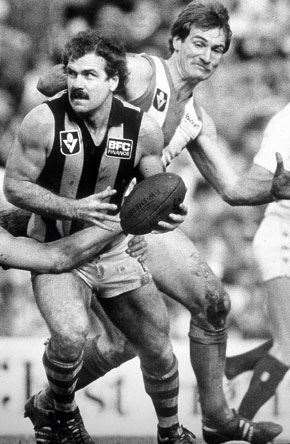 Lethal Leigh on the prowl for the Hawks in his prime. image: Getty Images
Lethal Leigh on the prowl for the Hawks in his prime. image: Getty ImagesThat old line of Kennedy’s seems to have gained new currency: “Don’t think. Do.” I kept hearing that in the lead-up to the grand final last year.
It’s interesting, because one of the things you know when you play an instinctive sport like Australian football is if you think, it’s too late. One of the things you always know at the end of the game is that if you played well, you would’ve almost not consciously thought at all. If you play badly, you always think, “I’m thinking too much and I’m not doing.” One of the things I used to do as coach of the Lions was say, “When the game stops and the umpire’s got the footy, you’ve got a few seconds to think: What am I supposed to be doing? Where am I supposed to be? For the rest of the game, you haven’t got time to consciously think. You’ve got to get on with instinctively doing whatever first thought comes into your mind.” And that was it in a few short sentences.
There have been some famous one-liners in coaching. Your own “If it bleeds, we can kill it” and Clarkson’s “Kill the shark”.
I think we all react quite well to themes and as a coach you’re always trying to see if you can think of a theme that might just prod everybody … And that was a theme I always liked, that Arnold Schwarzenegger line from Predator, when he saw the green blood of the alien and said, “If it bleeds, we can kill it.”
Now that you’re not involved with a top flight club, do you support anyone, or are you neutral?
I think generally I’m a footy fan who likes the footy, but I’m not a keen supporter. A keen supporter feels emotionally good when they win and a bit down when they lose. I’m not in that category. But the team that you play for is the club that tends to, I guess, own you or want to own you, because I guess playing is what the game is all about. I mean, coaching, you’re sitting in the stand watching. No one sees you. So I’m involved in three clubs, and even though the Lions are the most recent, I think Hawthorn have always embraced me as a former player, and that’s a closer link than a former coach, I think.
Can you see yourself coaching in the AFL ever again?
Well, the answer’s “no” today. Do I want to coach again? There might come a time when I want to coach again, but I think my time in football coaching has almost expired, partly because the late ‘50s coaches aren’t too fashionable in AFL. So, even if I wanted to coach again, I suspect the unfashionability of my age bracket might prevent that happening. So, emotionally and practically, I think it’s very unlikely.
Was there ever a lingering desire to come back to coach Hawthorn?
At odd times there has been. I kind of think that I’m happy … I think of a guy like Peter Knights. He still has a good relationship with Hawthorn, a great player, but he coached Hawthorn at a difficult time. Coaches and footy clubs very rarely end harmoniously. And I chose to do that up here [resign from the Lions] because I just wanted to make sure I went a year early rather than a year too late. On that basis, I’m just happy enough that I’m the ex-Hawthorn player and haven’t coached and had the chance to be turfed out or what have you … Don’t damage the friendship. There was always a little bit of romance, but I think the romance is probably overwhelmed by the practicalities.
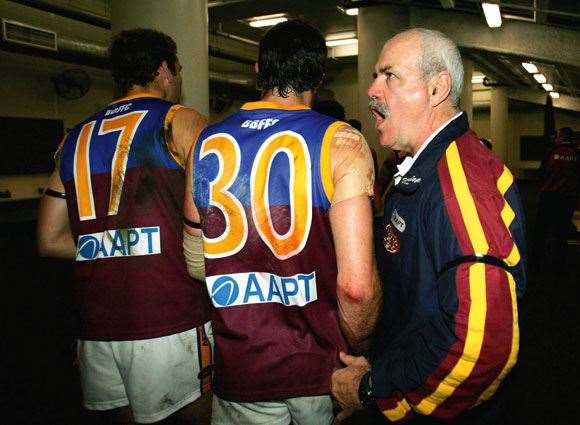 Legends like Kennedy, Parkin and Jeans all helped make Matthews a coaching marvel. Image: Getty Images
Legends like Kennedy, Parkin and Jeans all helped make Matthews a coaching marvel. Image: Getty ImagesHow do you receive an accolade like Player of the Century when you look over the vast history of the game?
To be honest, it’s fantastic for someone to have said that. I mean, my clear ambition was to be the best player ever, and you never can be that. But the fact there have been some people who have actually said that, I’m very chuffed by that.
What do you think of the statue of yourself outside the MCG?
It’s an honour, not that I see it all that often. If people ask, “What’s your favourite place in the world?” I usually say the MCG. It evokes so many things that’ve been good, so
to have the statue outside is good.
Did you have a day job throughout your playing days?
I left school and I was a trainee at Dunlop Automotive. I sold trucks for a few years. I had a sports store for five years and that was when shopping hours were Friday night and Saturday morning. I played my best footy in that era, my prime. I’d be in there selling footy boots on Friday night. I’d go in for an hour and a half on Saturday mornings, and then off to the footy. I look back at that as one of those things – physically it might not have been incredibly helpful, but what it did was keep me relaxed and kept my mind off it. Keeping occupied is pretty important, just as a mental tool.
Do you think that’s why we see so many professional footballers behaving badly these days?
But they’re not behaving badly during the day. The behaving badly tends to be weekends. When I played in that era, not many would’ve drank during the week. Some might’ve, but Saturday night we binge drank. It was just more accepted in that era. It’s horrible to think in the pre-drink driving era the state you turned up in at Sunday morning training sometimes. The modern footballer drinks heaps less than the footballers used to in previous eras. So I don’t hold that the “not working” has any relationship to “every now again a player drinks too much and does something stupid”.
Do you believe sporting clubs can make you a better person?
Yep. Totally. Whatever you might’ve been, you will be a better person coming through a sports club, because it teaches you discipline … I would argue that elite sport never actually makes you a worse person. It makes you a better person. But there are about a thousand of them, so it doesn’t mean that every elite sportsperson is going to be a fantastic role model at all times. I do think the sporting environment assists you. The only thing is, there’s always a concern that you’re stopping them growing up instead of teaching them to grow up. And the era of player managers can really come under that umbrella. Nowadays, every player has a manager and the manager’s job is to keep him as his manager, so I’m not sure whether many managers stop them growing up because they like them to be beholden to them … I heard one story of a bloke who’s married, a 26-year-old, his manager was still paying his bills. I mean, that’s stopping them growing up.
– Tim Baker
Related Articles
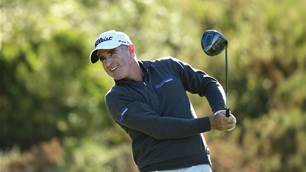
Video interview: Drinks With ... Matt Millar
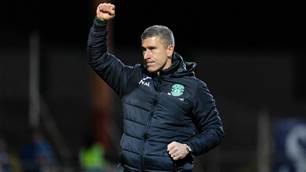
Champion A-League coach set to join Premier League giants
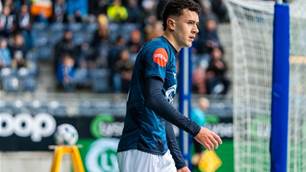
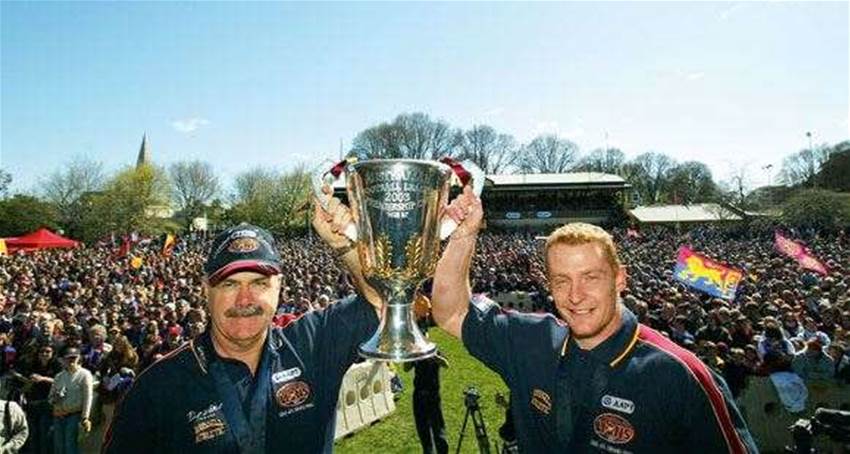



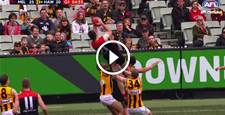
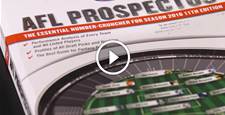
.jpg&h=115&w=225&c=1&s=1)
